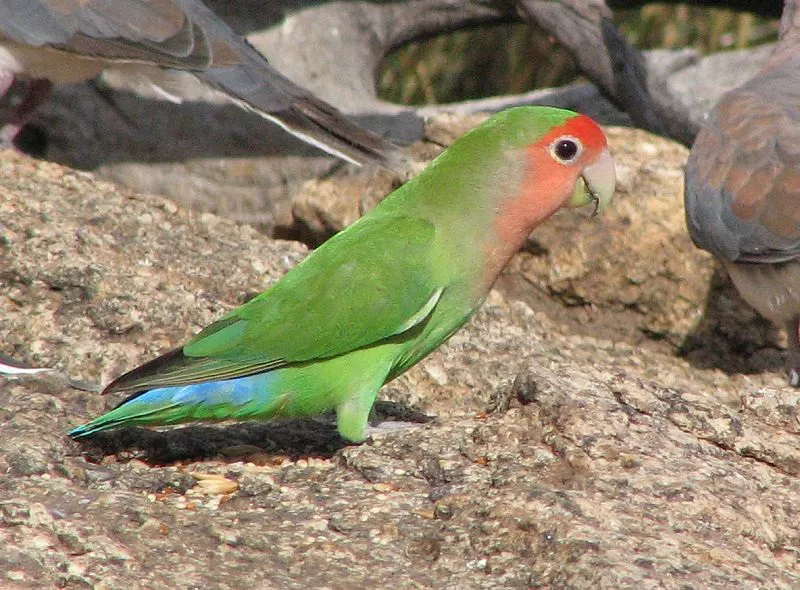The rosy-faced lovebird (Agapornis roseicollis), also known as the peach-faced lovebird, is a small parrot species native to arid regions of southwestern Africa. These charming and sociable birds have captivated bird enthusiasts and pet owners worldwide with their vibrant colors and engaging personalities. In this article, we will explore the characteristics, care requirements, and appeal of the rosy-faced lovebird as a companion bird.
Physical Characteristics:
The rosy-faced lovebird is known for its striking appearance. It features a predominantly green plumage with a vivid peach-colored face, throat, and upper chest, giving it its common name. Additionally, they have bright blue tail feathers, which provide a beautiful contrast against their green and peach coloring. Adult lovebirds measure about 6 to 7 inches (15 to 18 cm) in length, making them a compact and visually appealing avian species.
Social Nature:
One of the most endearing qualities of rosy-faced lovebirds is their sociable nature. They are highly social birds that thrive on companionship, both with their human caregivers and other lovebird companions. These parrots form strong pair bonds, often displaying affectionate behaviors such as preening each other and engaging in mutual grooming. Their lively and playful personalities make them delightful pets that enjoy interaction and mental stimulation.
Care and Housing Requirements:
Providing a suitable environment is crucial for the well-being of rosy-faced lovebirds. A spacious cage with plenty of room for exercise and flight is essential. The cage should be equipped with perches, toys, and branches for climbing and exploration. Lovebirds are active birds that require regular exercise, so allowing supervised out-of-cage time in a safe and bird-proofed area is recommended.
A nutritionally balanced diet is vital for the health of rosy-faced lovebirds. A combination of high-quality commercial bird pellets, fresh fruits, vegetables, and seeds can provide the necessary nutrients. Fresh water should always be available, and food dishes should be cleaned daily to maintain hygiene.
Interaction and Enrichment:
Rosy-faced lovebirds thrive on social interaction and mental stimulation. They enjoy spending time with their human caregivers, whether it’s through gentle handling, talking to them, or engaging in interactive play sessions. Lovebirds are intelligent birds that benefit from enrichment activities such as puzzle toys, foraging opportunities, and a variety of stimulating toys to keep them mentally engaged.
Vocalizations:
While not known for their talking abilities like some larger parrot species, rosy-faced lovebirds are still quite vocal. They communicate through a range of chirps, squawks, and short calls, which serve as social communication and vocal displays. Their vocalizations are a way of expressing their emotions and maintaining contact with their flock members.
Longevity and Health:
With proper care and a nutritious diet, rosy-faced lovebirds can live for approximately 15 to 20 years or more in captivity. Regular veterinary check-ups, a clean living environment, and a balanced diet contribute to their overall health and well-being. Monitoring their weight, feather condition, and behavior can help detect any potential health issues early on.
As pets:
Rosy-faced lovebirds are popular pets due to their playful and affectionate nature. They are easy to care for and can adapt well to living in captivity. However, they require a lot of attention and interaction with their owners to prevent boredom and loneliness. It is recommended that they be kept in pairs or small groups to provide them with social interaction. Rosy-faced lovebirds also need a spacious cage with plenty of toys, perches, and nesting material. A balanced diet consisting of seeds, fresh fruits, and vegetables is essential for their health.
Conclusion:
The rosy-faced lovebird is a captivating and sociable avian companion that brings joy and vibrancy to any bird lover’s life. Their stunning appearance, playful nature, and affectionate personality make them popular pets among bird enthusiasts. Providing a suitable environment, social interaction, and a balanced diet are key to ensuring the well-being and happiness of these delightful parrots. With the right care and attention, rosy-faced lovebirds can become cherished companions for many years to come.


 Facebook
Facebook  Instagram
Instagram  Youtube
Youtube 